What I’ve Learned as a White Mom Raising Two Black Sons
For Kristen Howerton and her husband, Mark, the decision to adopt two black sons wasn’t tough. But as white parents, they admit it can be tough to talk to their boys and two biological daughters about racism.
“You can’t not think about racial bias … just look at the bias in adoption: The fact is that in our state, 7 percent of adopting couples are open to black children. Seven percent,” the Costa Mesa, Calif., mother of four tells Yahoo Parenting about forming her transracial family: sons Jafta, 10, adopted from L.A. County foster care; Kembe, 9, adopted from Haiti; and daughters India, 9, and Karis, 6. “You can’t go into adoption and know those statistics without understanding that our country has a race problem. … And it’s absolutely heartbreaking to think of the challenges that [my sons] will face based on these factors that are irrelevant to their character.”
Story: 7 Things I Can Do That My Black Son Can’t
In a candid interview about raising children of different races as part of Yahoo Parenting’s “What It’s Like” original video series, Kristen explains that her concerns are mostly the same as any parent’s. “But then there’s an extra component of fear, I think, when you’re raising black boys, like, they could get in a bad situation or mistakes could be made based on their appearance.”
Story: ‘You Are So Beautiful!’: How White Mom Bonds With Black Daughter Over Her Hair
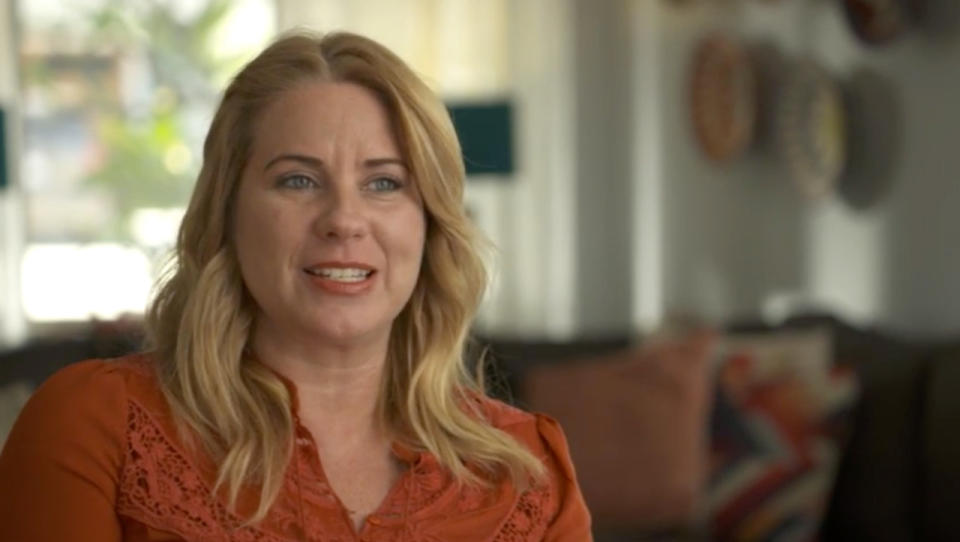
Photo: Yahoo Parenting
Adoption was always on her agenda, though, says Kristen, 40, who decided to pursue it with Mark, 42, after she experienced several miscarriages. “I was very aware that black children, and specifically male black children, were overrepresented in foster care.” With two biracial males already in her extended family, Kristen says, “I just felt like we could very comfortably adopt black males. So our criteria was wide open, but I knew that by doing that, it would be most likely that our placement would be a black child.” When Jafta was placed with them when he was 6 months old, she says, “We were thrilled.” (Three years later — after the couple welcomed their first daughter, India — they were able to formalize his adoption.)
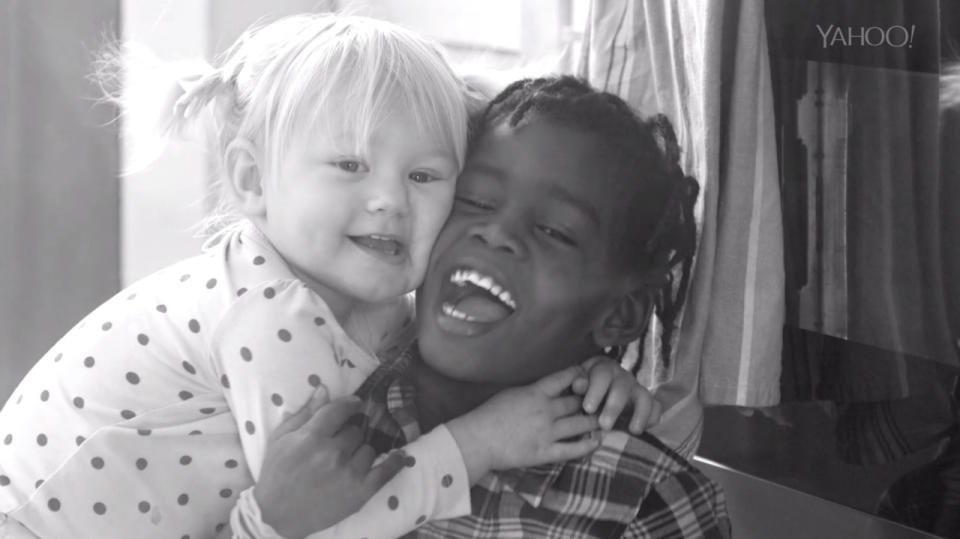
Photo: Yahoo Parenting
“I always knew that we would adopt more than one child,” she continues. “Especially because our first child was black. I thought it was really important that he have someone in the family who mirrored him, who he could relate to on that level. … I didn’t want him to be isolated as the only person of his race in our family.” So before long, they began the process of adopting from Haiti, during which the Howertons welcomed another daughter, Karis.
Story: Dad to Rachel Dolezal: Raising Black Kids Doesn’t Make You Black
“We chose to adopt from Haiti because I had actually been there a few times … and I really loved the country,” says the mom, who writes a blog Rage Against the Minivan. “I had friends who lived there and I was really aware that there were children waiting.” Kembe was 6 months old when the family committed to being his parents, but he wasn’t able to join them in California until he was 3 ½ because of red tape and the 2010 earthquake, from which he was evacuated on a military jet.
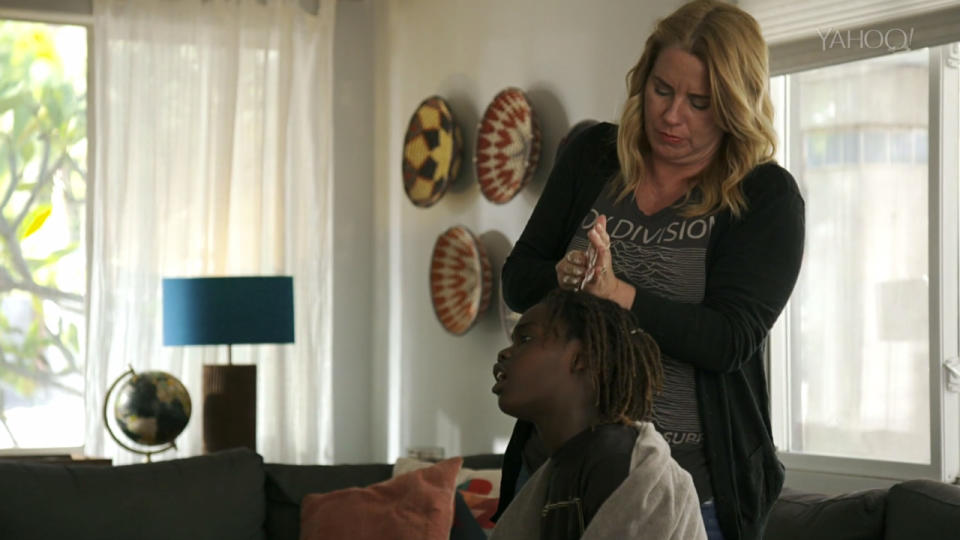
Photo: Yahoo Parenting
Welcoming Kembe at age 3 presented different challenges than the couple experienced in the beginning with Jafta, who’d been a baby when he joined the family. The greatest “learning curve” in terms of dealing with racial difference was caring for Jafta’s hair, says Kristen. With Kembe, they fielded larger cultural conundrums right off the bat. “We really had these grand ideas that we would keep his language and culture intact,” the mom says, noting she and her husband learned to speak some Creole and put up Haitian art in their home. Yet all her son wanted was to assimilate. “He did not want to be a Haitian kid,” she explains. “He wanted to be an American kid. He wanted to learn English very quickly and wanted to dress and act and look like every other kid that is here — to the point where we would be speaking to him in Creole and he would answer back in English.“ The parents told themselves, Kristen says, “‘That’s what he needs for right now. And we can come back and revisit this.’ And we do. We’ve gone back and visited Haiti as a family and tried to kind of reintroduce Creole. But [Kembe] very much wants to be a typical American kid. He wants to wear his skater clothes and to say ‘totally’ and ‘dude’ and have that California inflection. That’s who he is.”
Story: Dad’s Conversations About Race: ‘Most White Kids Don’t Get This Talk’
As the white mother of two black sons, Kristen says she is constantly talking with her kids about race. “It’s easy to go into transracial adoption thinking love is all you need,” she says. “That your love will transcend, that color doesn’t matter. But it really does matter, and we’re noticing that absolutely more and more as our boys are getting older.”
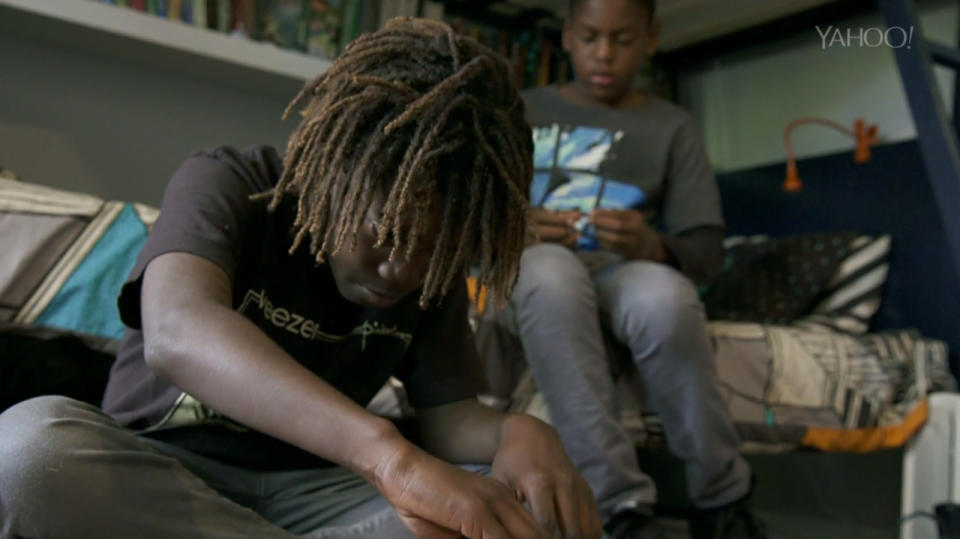
Photo: Yahoo Parenting
How her sons are viewed by strangers, for instance, recently become an issue. “They’re perceived as older, and research shows that to be true,” she says. “They are perceived as more threatening than their white counterpoints. And that’s a steep learning curve [for us] because you’d like to think that society is better than it is on this issue.” If her sons go to a playground, she notes, “There’s this sort of ‘Where are the parents?’ feeling that I don’t feel like is the same for my girls. … And I’m always very on alert and making sure that any interaction with them from another adult is on par with what’s appropriate for their age.” Then, at home, the family talks about her sons’ race and their height. She says she tells the boys, “‘People are going to have different expectations of you, because you are 10 and look like a teenager.’ These are conversations that we have a lot.”
Story: What Happens When Minority Kids Are Taught Not to Speak of Race
When her sons play is another factor that the family considers due to race. “In our neighborhood, at dusk a lot of the kids play hide-and-seek, and it’s dark,” says Kristen. “People are coming home from work, and there’s kids running around the neighborhood, and I think, I have a black son who’s as tall as me. He can’t be running through people’s yards at night.”
What Jafta and Kembe choose to wear isn’t always easy either, sparking talks about racial profiling and Trayvon Martin. “We’ve had conversations about hoodies as well,” she says. “It’s just one of those little decisions that you make as a parent. When we’re buying a hoodie, I’m going to buy a hoodie in a bright color.” She reveals that she asks herself, “What’s my kid going to look like walking down the street in this hoodie? How can I skew it to not have people make assumptions about him? Which is horrible. It’s a horrible way to have to think. But it’s life.”
Being raised in a white family, she acknowledges, “My boys are definitely having a different life experience … I think that it would be ignorant to say that they’re not.” Having created this family unit, she says, “Our job is to mitigate that difference. Our job is to make sure we’re giving [our sons] experiences and knowledge making up for what is lacking here: two black parents who understand that experience and can coach them from that.”
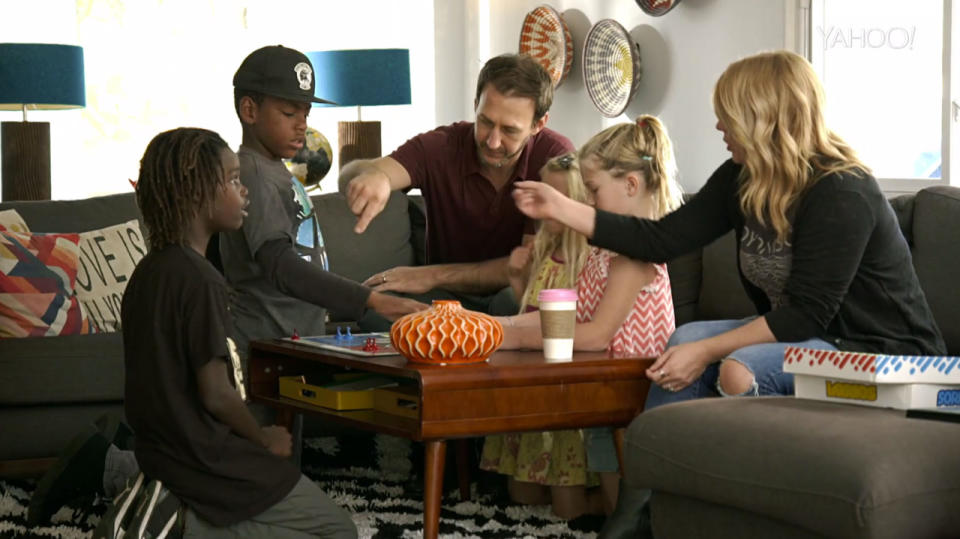
Photo: Yahoo Parenting
To help “bridge that gap” between their white and black identities, the Howertons spend time with black cousins and black friends. “It’s really prideful to think as a white person, I’ll just take care of it all by myself,” she says. “So we’re really intentional in broadening our circles and making sure that we have black people in our life. … I think it’s OK for me to recognize I can’t do this, you know? I can’t meet this need for my kid. I don’t have this experience.”
These connections help her too. “One of the conversations I seek the most help on is how to talk to my boys about racial bias,” she says. “How to have the talk with black young men about some of the prejudice they may encounter and specifically around some of the issues of police violence against black men.”
The parents have made missteps along the way, they admit. “I really thought that I was doing a great thing by signing the boys up to be in a Cub Scout group that was all African-American,” Kristen confesses. “But they ended up being upset with me, because they wanted to be in the Cub Scout group with their school and with their friends from school.” But, she says, she keeps trying to “introduce them to good role models, and to make them feel really proud to be black.” Living in a predominantly white community, it was initially work, she concedes.
They found a black barber the family now goes to, and they also attend a black church. “We try hard to make sure that they have experiences in the black community,” Kristen says. “Sometimes that can be uncomfortable for us as white parents, but we have felt very welcomed … and I think a part of that is that people can see that we’re trying … and this is about the boys.” But overall, “instilling a sense of confidence and pride in their skin color and their race…[is] something that any parent of a black child has to do, including black parents,” she adds.
Today, Kristen says, being involved in the black community has become “a part of who we are and I actually really feel like it’s added to our lives, not just to the boys, but to my life. The friendships and the experiences that we’ve had, kind of pushing forward in the community, have been a gift to all of us, my girls included.”
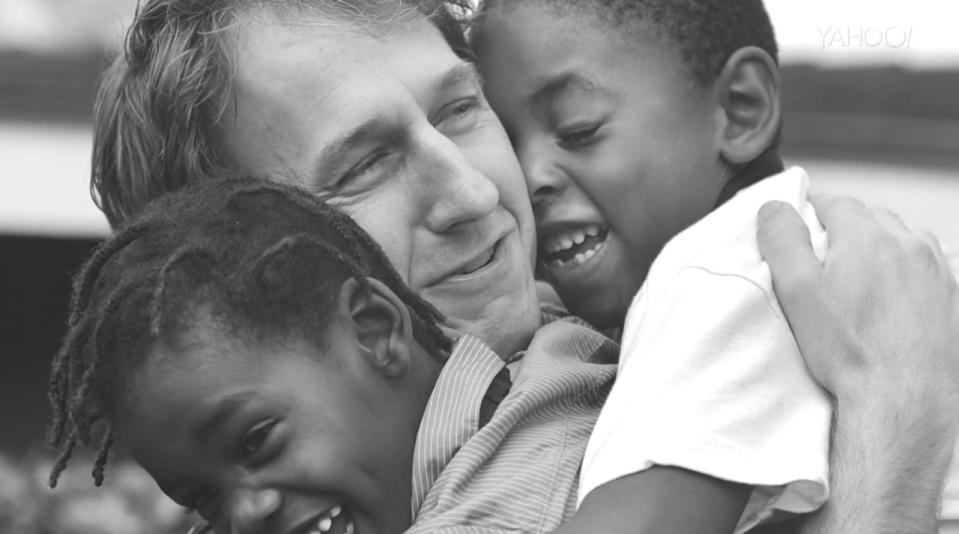
Photo: Yahoo Parenting
Yet when it comes to the reaction she gets from people who meet her family, there can be negativity, from both sides. “White people will often think, Oh, you saved your kids, something obnoxious like that, which for me, it’s like, ‘No, I’m parenting my kids,’” says Kristen. “I’m parenting them the same way anyone else is. And then, I think sometimes black people might have a healthy skepticism about white people parenting black children — and I totally get it. …They might be concerned that we’re not paying attention … that we’re not going to prepare them for the racism that they might encounter … [that] we may not instill them with a great sense of self as a black person.”

Photo: Yahoo Parenting
Kristen doesn’t shy away from the reality of discrimination. Talking with her sons about it, she says, is “kind of like having the sex conversation, in that it shouldn’t be one conversation. It should be an ongoing conversation about things as they are developmentally appropriate.” Regardless of skin tone, “everyone is nervous about having these conversations with their black sons,” she adds. “It’s a heavy weight for everyone. Is there a pit in my stomach about those conversations? Absolutely. There’s a weight and a sadness to it, but I think it absolutely has to happen at the same time, because that’s how I prepare them to negotiate the world that they live in.”
“I want to give them every resource,” the mother says. “To me, it’s like, I want to build them up so that they can face this and that. I’m going to be building them up in ways I’m not building up my girls because [Jafta and Kembe] have this extra challenge that they have to deal with in terms of bias and prejudice.” As the mother to two black sons, she says, “My job for 18 years is to just pour into them and give them every resource that [I] can so they can mitigate this and be the best person they can be.”
And when strangers see her family together, Kristen doesn’t want them to see children who are “colorblind,” she says. “I wish people understood that the fact that my kids get along as siblings doesn’t mean that … they don’t notice each other’s race. …They are real siblings and they notice each other’s race. Both of those things can be true at once.”
“I hope when people see my family, they see a family that loves each other,” she adds. “I mean, I think that that’s probably a value that’s shared by any parent, that [you want people to] see a connected and bonded family.”
Top photo: Yahoo Parenting
Please follow @YahooParenting on Facebook, Twitter, Instagram, and Pinterest. Have an interesting story to share about your family? Email us at YParenting (at) Yahoo.com.

